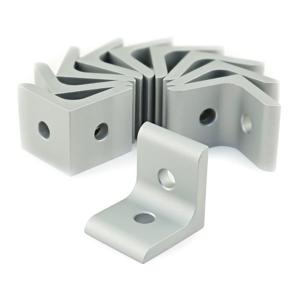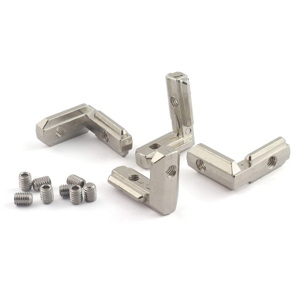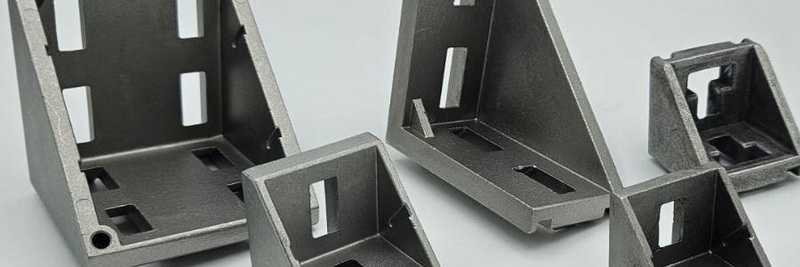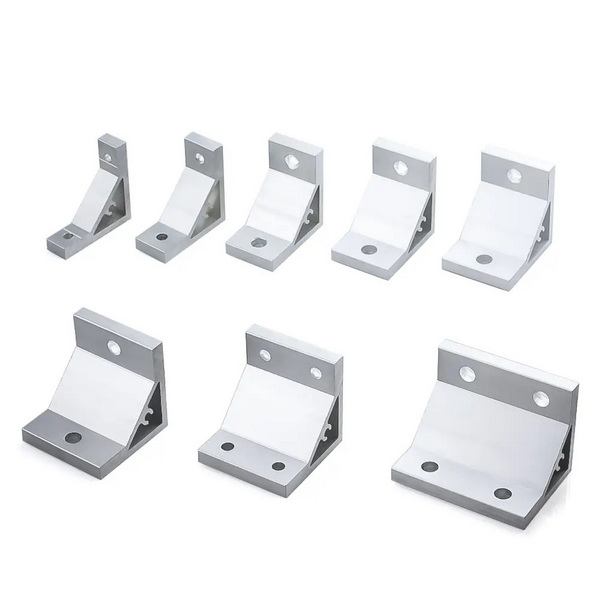Content Menu
● Understanding Aluminum Extrusion 90 Degree Brackets
● Common Applications of Aluminum Extrusion 90 Degree Brackets
>> 1. Machine Guards
>> 2. 3D Printer Enclosures
>> 3. Custom Furniture
>> 4. Retail Displays
>> 5. Solar Panel Mounting Systems
● Additional Applications
>> 6. Robotics and Automation
>> 7. Exhibition Stands
>> 8. DIY Projects
● Advantages of Using Aluminum Extrusion 90 Degree Brackets
● Choosing the Right Aluminum Extrusion 90 Degree Bracket
● Installation Tips
● Maintenance Considerations
● Design Considerations When Using Aluminum Extrusion Brackets
● Case Studies: Successful Implementations of Aluminum Extrusion Brackets
>> Case Study: Automotive Industry
>> Case Study: Aerospace Sector
>> Case Study: Home Automation Systems
● Future Trends in Using Aluminum Extrusions
● Conclusion
● FAQ
>> 1. What materials are aluminum extrusion 90 degree brackets made from?
>> 2. Can I use aluminum extrusion 90 degree brackets outdoors?
>> 3. How do I install an aluminum extrusion 90 degree bracket?
>> 4. Are there different sizes available for these brackets?
>> 5. What are some creative uses for aluminum extrusion 90 degree brackets?
Aluminum extrusion 90 degree brackets are essential components in various construction and assembly projects. Their versatility, strength, and lightweight nature make them ideal for a wide range of applications. This article explores the best uses for these brackets, providing insights into their functionality, advantages, and practical applications across different industries.

Understanding Aluminum Extrusion 90 Degree Brackets
Aluminum extrusion 90 degree brackets are designed to connect two aluminum extrusions at a right angle. They typically feature slots that align with the T-slots of aluminum profiles, allowing for secure connections without the need for welding or complex machining. This design not only simplifies assembly but also enhances the structural integrity of the connections.
Key Features:
- Material: Made from high-quality aluminum, these brackets are lightweight yet strong.
- Corrosion Resistance: Aluminum is inherently resistant to corrosion, making these brackets suitable for both indoor and outdoor applications.
- Modularity: They can be easily integrated into modular systems, allowing for flexibility in design and construction.
Common Applications of Aluminum Extrusion 90 Degree Brackets
The applications of aluminum extrusion 90 degree brackets are vast and varied. Here are some of the most common uses:
1. Machine Guards
In industrial settings, safety is crucial. Aluminum extrusion 90 degree brackets can be used to construct sturdy machine guards that protect operators from moving parts. Their ability to create rigid frameworks ensures that the guards remain stable and effective over time.
Example: A manufacturing facility might use these brackets to build protective enclosures around conveyor belts or robotic arms, ensuring that workers are shielded from potential hazards while maintaining visibility into the operation.
2. 3D Printer Enclosures
For 3D printing enthusiasts, maintaining a controlled environment is essential for achieving optimal print quality. These brackets can be used to build custom enclosures that regulate temperature and protect prints from external factors like dust and drafts. The lightweight nature of aluminum makes it easy to create large structures without excessive weight.
Example: A DIY enthusiast might design an enclosure using aluminum extrusion 90 degree brackets to house their 3D printer, integrating fans and filtration systems to enhance print quality while minimizing noise.
3. Custom Furniture
Aluminum extrusion 90 degree brackets allow designers to create modern and sleek furniture pieces tailored to specific spaces. From coffee tables to shelving units, these brackets facilitate the construction of unique designs that stand out while providing necessary support.
Example: A designer could use these brackets to create an open shelving unit in a kitchen, combining wood shelves with aluminum frames for a contemporary look that is both functional and stylish.
4. Retail Displays
In retail environments, visual appeal is key. Aluminum brackets can be used to create attractive display units that showcase products effectively. Their clean lines and customizable configurations make them ideal for modern retail spaces.
Example: Retailers often use aluminum extrusion 90 degree brackets to construct modular display stands that can be easily rearranged or expanded based on seasonal promotions or new product launches.
5. Solar Panel Mounting Systems
With the growing demand for renewable energy solutions, aluminum extrusion 90 degree brackets play a vital role in solar panel installations. They provide strong support for mounting systems that need to withstand various weather conditions while maintaining optimal angles for sunlight exposure.
Example: In residential solar installations, these brackets can be used to securely mount solar panels on rooftops or ground mounts, ensuring durability and stability over time.

Additional Applications
Beyond the common uses mentioned above, aluminum extrusion 90 degree brackets find applications in several other areas:
6. Robotics and Automation
In robotics, precision is key. These brackets can be used to construct frames and supports for robotic arms or automated machinery. Their ability to maintain structural integrity under dynamic loads makes them ideal for this application.
Example: A robotics company might utilize aluminum extrusion 90 degree brackets to build a framework for an automated assembly line robot, ensuring stability during operation while allowing for easy adjustments as needed.
7. Exhibition Stands
For trade shows and exhibitions, having a reliable display system is essential. Aluminum extrusion 90 degree brackets can be used to create lightweight yet sturdy exhibition stands that are easy to assemble and disassemble.
Example: Companies often use these brackets in conjunction with fabric graphics or signage to create eye-catching displays that can be quickly set up at various events.
8. DIY Projects
For hobbyists and DIY enthusiasts, aluminum extrusion 90 degree brackets offer endless possibilities. They can be used in various projects ranging from custom bike racks to home automation systems.
Example: A DIYer might use these brackets to build a custom workbench in their garage, incorporating storage solutions that maximize space efficiency while maintaining a clean aesthetic.
Advantages of Using Aluminum Extrusion 90 Degree Brackets
The benefits of using aluminum extrusion 90 degree brackets extend beyond their basic functionality:
- Lightweight: Their low density makes them easy to handle and transport.
- Strength: These brackets enhance the strength of connections between extrusions, creating stable structures.
- Corrosion Resistance: Ideal for outdoor use, they require minimal maintenance over time.
- Customization: Available in various sizes and configurations, they can be tailored to meet specific project needs.
- Ease of Assembly: The design allows for quick assembly without specialized tools or skills.
Choosing the Right Aluminum Extrusion 90 Degree Bracket
When selecting an aluminum extrusion 90 degree bracket for your project, consider the following factors:
- Type of Connection Needed: Determine whether you need a simple right-angle connection or something more complex.
- Size Compatibility: Ensure that the bracket matches the size of your aluminum profiles (e.g., U8 or U10).
- Load Requirements: Assess how much weight your structure needs to support; some brackets are designed for heavier loads.
- Aesthetic Preferences: Choose a bracket style that complements your overall design vision.
Installation Tips
Installing aluminum extrusion 90 degree brackets is straightforward:
1. Align the bracket with the T-slots of the aluminum profiles.
2. Insert T-nuts into the slots.
3. Secure the bracket using screws or bolts as needed.
4. Ensure everything is tightened properly to maintain structural integrity.
Maintenance Considerations
While aluminum is low-maintenance due to its corrosion resistance, regular checks should be performed:
- Inspect connections periodically for any signs of wear or loosening.
- Clean surfaces with mild soap and water to remove dirt or grime buildup.
- Avoid harsh chemicals that could damage finishes or coatings on the aluminum.

Design Considerations When Using Aluminum Extrusion Brackets
When designing structures with aluminum extrusion 90-degree brackets, it's essential to consider several factors:
- Load Distribution: Understanding how weight will be distributed across your structure is critical when determining where to place your brackets.
- Environmental Factors: If your project will be exposed to harsh environmental conditions (e.g., extreme temperatures or moisture), ensure you choose appropriate materials and finishes.
- Aesthetic Integration: Consider how visible your joints will be; sometimes additional covers or decorative elements may enhance overall appearance while hiding functional components like screws or bolts.
- Future Modifications: If you anticipate needing adjustments later on—such as adding more shelves or changing configurations—designing with modularity in mind will save time and effort down the line.
Case Studies: Successful Implementations of Aluminum Extrusion Brackets
Examining real-world examples provides valuable insights into how effectively these components can be utilized across different sectors:
Case Study: Automotive Industry
In automotive manufacturing plants where precision assembly lines operate at high speeds daily—aluminum extrusion 90-degree bracket systems have been integrated into robotic arms designed specifically for assembling vehicle parts efficiently without compromising safety standards.
Case Study: Aerospace Sector
The aerospace industry has also seen significant benefits from employing these versatile connectors within aircraft assembly processes—helping engineers create lightweight yet robust frameworks necessary during flight testing phases.
Case Study: Home Automation Systems
Home automation enthusiasts have embraced using aluminum extrusions alongside their corresponding hardware components—creating customized setups tailored precisely according each user's preferences.
Future Trends in Using Aluminum Extrusions
As technology continues evolving rapidly—so too does our understanding surrounding materials science! Some emerging trends worth noting include:
- Increased focus on sustainability: Manufacturers are exploring ways recycle scrap materials generated during production processes back into new products—further reducing waste output!
- Advancements in additive manufacturing techniques: Combining traditional methods with innovative approaches such as three-dimensional printing allows designers unprecedented freedom when experimenting with shapes/form factors previously thought impossible!
- Enhanced surface treatments: New coatings developed specifically targeting durability against environmental stressors promise longer-lasting performance without sacrificing aesthetics.
By staying informed about current trends affecting this industry—it becomes easier not only adapt existing practices but also anticipate future needs!
Conclusion
Aluminum extrusion 90 degree brackets are invaluable components in modern construction and design projects. Their versatility makes them suitable for a wide range of applications—from industrial safety solutions to custom furniture designs. By understanding their features and advantages, you can effectively incorporate these brackets into your projects, enhancing both functionality and aesthetic appeal.

FAQ
1. What materials are aluminum extrusion 90 degree brackets made from?
Aluminum extrusion 90 degree brackets are typically made from high-quality aluminum alloys known for their strength and corrosion resistance.
2. Can I use aluminum extrusion 90 degree brackets outdoors?
Yes, due to their corrosion-resistant properties, these brackets are suitable for outdoor applications such as solar panel mounting systems and outdoor furniture.
3. How do I install an aluminum extrusion 90 degree bracket?
Installation involves aligning the bracket with T-slots on aluminum profiles, inserting T-nuts into the slots, and securing it with screws or bolts.
4. Are there different sizes available for these brackets?
Yes, aluminum extrusion 90 degree brackets come in various sizes to match different profiles (e.g., U8, U10) and load requirements.
5. What are some creative uses for aluminum extrusion 90 degree brackets?
They can be used in various innovative projects such as custom shelving units, display stands in retail environments, and enclosures for electronics like 3D printers.























